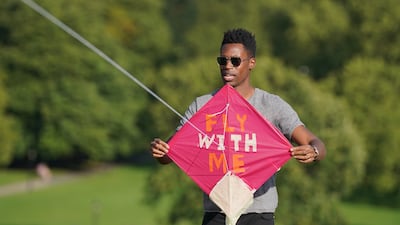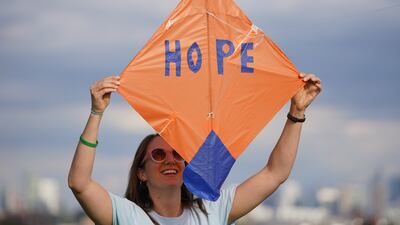People gathered in a London park on Tuesday afternoon to fly colourful kites as a message of solidarity to the people of Afghanistan on the second anniversary of the Taliban takeover.
Those involved wanted to be “a voice, far from our home” for all those who are now living under the oppressive regime, especially women and girls, one Afghan refugee now living in the UK said.
A similar event was held last August when the Good Chance theatre teamed up with Afghan artists and more than 70 partners globally for what they said was the world’s largest international kite festival.
This year’s gathering was expected to be smaller and more informal but no less important, according to refugee Amir Ibrahimi.
“For women and girls we want to be a voice, far from our home," Mr Ibrahimi, 24, told reporters.
“We just want to show that Afghanistan was colourful, Afghanistan was full of nice culture, nice people, the girls who just want to improve themselves [through education], the women who were working with men shoulder-to-shoulder to improve their country.
“And a lot of things have been lost and deleted, especially hope. The people of Afghanistan lost hope.”
He said that, as they did during their rule in the 1990s, the Taliban had again banned many activities that brought people joy, including kite-flying.
“One of the more important parts of our Afghan culture is these amazing, multi-coloured kites and we fly them, make them, design them since we were children,” Mr Ibrahimi said.
“This is something that makes you really proud when you fly them because it is part of a hope for Afghan people.”

He said the tradition is hundreds of years old and flying kites, made of tissue paper and bamboo, is a common game in Afghanistan.
But Mr Ibrahimi said even this was no longer allowed by the Taliban.
“They have banned anything that people can enjoy," he said. “They are called the Taliban and unfortunately they have banned everything.
"They banned the kites, they banned music, they want to remove women from society and they are trying to delete everything that doesn’t follow their rules."
He said he felt “proud and happy to share our amazing culture here” in the UK, but sad that his fellow Afghans at home have been deprived of so much in the past two years.
“This year is going to be the second since my homeland fell to the Taliban and I am thinking I left my country at that time in one night and everything changed," Mr Ibrahimi said.
Those taking part in this and other kite-flying events this year were encouraged to use the hashtags #rememberAfghanistan and #flywithme to keep the plight of the Afghan people forefront of the public’s minds.
Mr Ibrahimi, a marketing and production assistant at the Good Chance theatre in East London, has been living in a hotel in Southend-on-Sea for almost two years as he struggles to find long-term accommodation.
He has spoken of the challenging situation for refugees who are trying to find permanent homes but often struggle, despite the government support provided.







